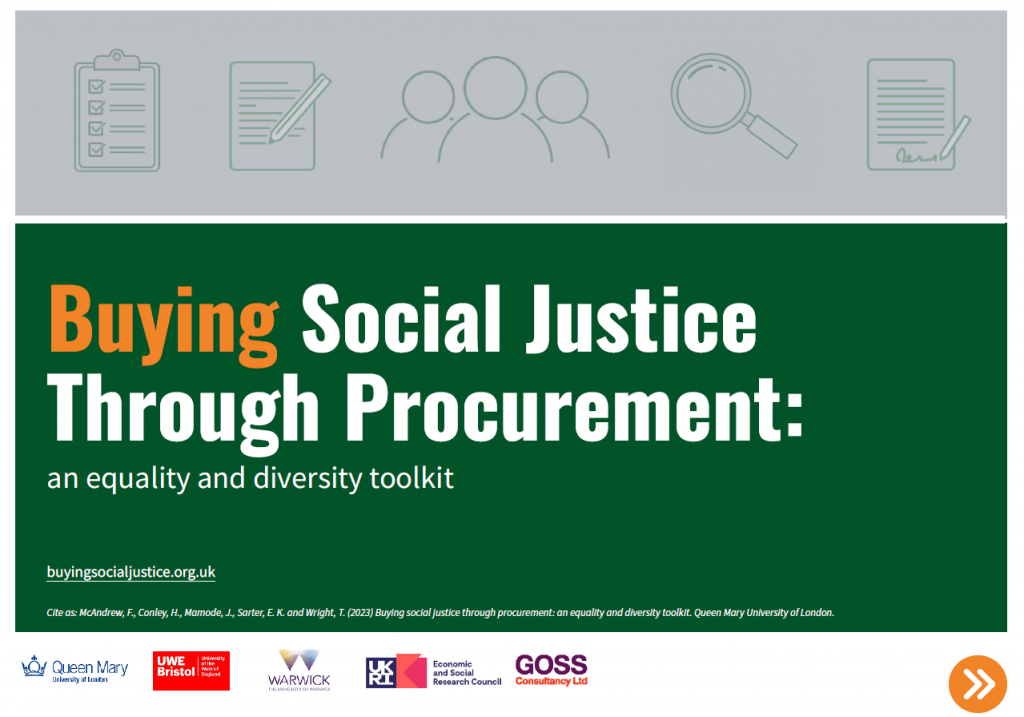Equality and diversity toolkit welcomed by speakers at launch
The Buying Social Justice project launched its toolkit for practitioners on including equality and diversity objectives within public procurement at a well-attended online event on 19 October 2023. Participants came from the devolved governments in Wales and Scotland and local government across England, Scotland and Wales, from universities, housing associations and the private sector, and included procurement and equality practitioners and academics.
The project team presented key findings from the two-year research project, which have fed into the guidance and good practice examples in the toolkit. One finding of the research was that procurement practitioners often felt that they did not have sufficient information about how to incorporate equality and diversity considerations into their procurement activities. It is hoped that the toolkit will fill this gap.
Buying social justice through procurement: an equality and diversity toolkit was written by Frances McAndrew of Goss Consultancy in collaboration with the project researchers, Professor Tessa Wright, Professor Hazel Conley, Dr Joyce Mamode and Dr E. K. Sarter.
Frances McAndrew introduced the toolkit, highlighting its interactive format, which allows users to move easily between the stages of the procurement process and to return to the toolkit at various points in the procurement journey. Frances emphasised the “golden thread” that should be woven throughout each of the five stages of procurement – preparing to procure, writing the specification, selecting suppliers, tendering and assessing, and contracting and monitoring – in seeking to build social justice into procurement. She pointed to the six good practice principles identified by the research: collaboration and partnership working; supplier engagement; strategic alignment; consistency; resourcing and senior leadership commitment. These themes were later picked up by speakers responding to the toolkit.
Chris Oswald, Principal for English Regions and Investment at the Equality and Human Rights Commission, stressed the potential for public spending to advance equality and diversity and improve opportunities for under-represented groups in construction work, for example. He highlighted the £4.8 billion of funds for the levelling up programme and the £120 billion in the combined City Region Deals in Scotland and Wales. He encouraged people to use the toolkit, saying “what we have here is a tool that helps you realise that potential.”
The toolkit features good practice from nine case study organisations from different parts of the public sector in England, Scotland and Wales. Speakers from four of the case studies shared some thoughts on how this had been achieved.
Osita Madu, Senior Equality, Diversity and Inclusion Manager Supply Chain at High Speed 2, identified the key factors for HS2’s success in achieving equality outcomes, noting the importance of commitment at the start from senior leadership and engagement with key stakeholders, such as all those involved in procurement. Additionally early market engagement was essential, ensuring that suppliers understood the EDI requirements of HS2 and would be able to deliver.
Simone Devinett, Head of Service, community and enterprise team, at RHA, a social landlord in South Wales, explained how RHA as a small organisation prioritised equality and diversity from the top, and introduced equality and diversity into assessment of tenders. The organisation also involves tenants in the evaluation of bids.
Anita Jane Smith, Legacy Officer at Glasgow City Region Deal, explained how the City Deal tries to embed the “golden thread” throughout, starting with governance structures, but also learning from procurement practice in the eight local authorities that make up the City Deal. Monitoring is a crucial part of this, and they have developed extensive systems to support this. She thought the toolkit would be very useful and would “borrow, steal and adapt” from it.
Babu Bhattacherjee, Director of Communities and Neighbourhoods at Poplar HARCA, a housing association in East London, saw procurement as a huge part of their work of trying to eliminate poverty in the community. He emphasised the importance of working in partnership, both with external experts in procurement, but also with contractors. He saw the toolkit as valuable for sharing examples of good practice with wider audiences.
The research project has been supported by an advisory board made up of equality and procurement experts. One member is Abigail Hunt, Policy Officer at the Trades Union Congress, who noted the role of public procurement in setting the employment conditions of outsourced workers in public services, saying that the TUC sees “procurement as crucial in shaping quality work and good jobs and in helping to further equalities.” Trade unions are involved at a variety of levels, for example by producing charters on anti-racism and disability at work that promote the use of procurement, by working with commissioning authorities at the start of contracting to include employment matters, and in the workplace to ensure that contract commitments on equalities or the Living Wage are enforced. She hoped that trade unions and others would use the toolkit, which “helps demystify the procurement process and puts meat on the bones of the ‘how’, concretely what are the entry points for those seeking to support equalities in workplaces and to work across the life cycle of the procurement process.”
Download the toolkit here: Buying social justice through procurement: an equality and diversity toolkit
A recording of the launch event is available to download here: Resources



